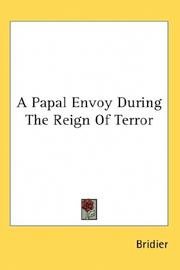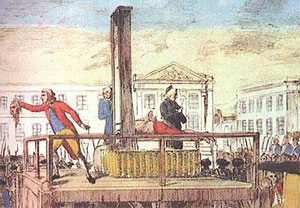When a revolution erupts in the West, the Catholic Church is an early target since it must be quickly neutralized. When the legitimate influence of the clergy and hierarchy is greatly diminished, the revolutionary process advances much more rapidly and efficiently. This can be clearly seen in the major revolutions in history: the England of Henry VIII, the France of Danton and Robespierre or the Germany of Hitler.
 This book, A Papal Envoy During the Reign of Terror is a 2009 reprinting of the memoirs of the Abbé de Salamon, internuncio to King Louis XVI and member of the judiciary’s Chambres des Vacations. It reveals this process of suppressing the Church in great detail as seen through one man’s life experiences during the French Revolution’s Reign of Terror.
This book, A Papal Envoy During the Reign of Terror is a 2009 reprinting of the memoirs of the Abbé de Salamon, internuncio to King Louis XVI and member of the judiciary’s Chambres des Vacations. It reveals this process of suppressing the Church in great detail as seen through one man’s life experiences during the French Revolution’s Reign of Terror.
This book recounts three periods of the Abbé’s life during the French Revolution. It is a book full of contrasts. One can find heroism and cowardice, fidelity and betrayal, kindness and unspeakable brutality, faith and despair, and belief in God and His Church to the point of death and wholesale apostasy.
The first phase of the Abbé’s life in revolutionary France begins with his appointment as internuncio to the French court by Pope Pius VI. Sensing the danger of the position, the Abbé asked the Pope in vain to allow him to decline the post. Eighteen days after his appointment, he was arrested at two o’clock in the morning by twenty soldiers and five government officials.
He was imprisoned in a large room with eighty other clerics and survived an attack by a mob, which stormed the prison in the middle of the night massacring prisoners right and left.
There are numerous examples of heroism and fidelity in this book. Madame Blanchet, his housekeeper, was one example. She constantly brought food to him and did all that she could to secure his release during his many incarcerations. She was occasionally imprisoned herself for rendering aid to a cleric and for refusing to reveal confidential matters.
Late one night, almost all of the clergy imprisoned with the Abbé were quickly judged and executed on the spot. Even when the judges would declare someone innocent, the mob would butcher them anyway. The book relates how the Abbé escaped the slaughter on this evening of blood and horror.
During the second phase of the Abbé’s account, he is a civil judge of the Chambres des Vacations. Since the Revolution had eliminated so many judges, the panel of judges was exhausted due to its great workload. They petitioned the king to accept their resignation, which he did. However, they also signed a document of fidelity to the king and protested the subversion of royalty by the Revolution. Unfortunately, the document fell into the wrong hands and it cost all, save the Abbé, their lives.
The Abbé became a hunted man. The book recounts the adventures of the Abbé as he moved from hiding place to hiding place, staying just one step ahead of the revolutionaries. It was only after the fall of Robespierre that his arrest warrant was voided.

The third phase of the Abbé’s life was under the Directory. The Abbé was once again appointed internuncio. Tremendous pressure was bought to bear put upon the Pope to accept the Civil Constitution of the Clergy. When the Pope would not compromise, Napoleon Bonaparte prepared to march upon Rome. When the Abbé tried to warn the Pope of a betrayal, this message was intercepted and he was arrested.
As a diplomat, the Abbé had acted fully within his rights, and, even under revolutionary law, diplomatic correspondence was immune from search and seizure. In gripping detail, the book recounts his trials as he defends his innocence.
When governments threaten the Church, it is essential to understand why. This book helps readers to see the role of the Church in troubled times. It above all stresses how the virtue of confidence is indispensable during any time of tribulation. Our Lady can see anyone who has confidence in Her, through any trial or seemingly unimaginable ordeal.
I highly recommend this book. It is a difficult book to put down because of the intense drama of the events it describes. It also has many valuable lessons for today’s Catholics who have their own trials that seem so great.
A Papal Envoy During the Reign of Terror
The Memoirs of Abbé de Salamon, the
Internuncio to King Louis XVI at Paris
during the Revolution, 1790-1801.

